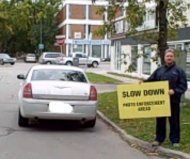Article from: www.thenewspaper.com/news/34/3452.asp
4/12/2011
Canada: Group Protests Winnipeg Speed Camera
Free photo radar warning signs made available to motorists in Winnipeg, Canada.
 Activists in Winnipeg, Canada have hounded city officials about problems with the photo radar program. The group WiseUpWinnipeg caught the city using improper warning signs, hiding information from freedom of information requests and exploiting short yellow timing at intersections. The group's leader, Larry Stefanuik, believed it was time to "amp it up" after his findings have been ignored.
Activists in Winnipeg, Canada have hounded city officials about problems with the photo radar program. The group WiseUpWinnipeg caught the city using improper warning signs, hiding information from freedom of information requests and exploiting short yellow timing at intersections. The group's leader, Larry Stefanuik, believed it was time to "amp it up" after his findings have been ignored.
"Mayor Sam Katz, Police Chief [Keith] McCaskill, ACS, councilors, Premier [Greg] Selinger and provincial politicians all turn a blind eye from the qualified research, the increased collision statistics and the success of real safety programs in other cities and countries," Stefanuik wrote. "They do not want to hear them or test them because they know revenue will drop quickly and the city will be on the hook for $5 million a year regardless. That leaves we the people no other choice than to force an intervention with the addict and try and get them off the juice by slowing or stopping the supply of cash earned in a predatory fashion. Yes it's time to hit them in the pocketbook."
The group is offering free warning signs that say "Slow Down, Photo Enforcement Ahead" and encouraging motorists to park behind photo radar vans and display the signs to warn fellow drivers in advance of the speed trap. Once the sign are up, Stefanuik finds that people slow down and the speed camera van no longer flashes.
"We figure a couple of really good months shutting them down will make an impact on the city's budget," Stefanuik told TheNewspaper.
Photo enforcement systems typically depend on surprise for maximum effectiveness. WiseUpWinnipeg caught city officials actively taking down photo enforcement signs from medians in order to increase the number of citations issued. The group compared recent photographs of photo ticketing locations with Google Street View imagery from 2009 and found a number of signs had disappeared.
Stefanuik last week pointed out that the desire to remove warning signs is at odds with publicity materials developed in in 2005. Winnipeg ran a campaign devoted to the message: "Thank you for seeing the signs and slowing down." Since Winnipeg has reduced the number of municipal signs, WiseUpWinnipeg hopes their privately funded warning signs will slow people down as well.
 Activists in Winnipeg, Canada have hounded city officials about problems with the photo radar program. The group WiseUpWinnipeg caught the city using improper warning signs, hiding information from freedom of information requests and exploiting short yellow timing at intersections. The group's leader, Larry Stefanuik, believed it was time to "amp it up" after his findings have been ignored.
Activists in Winnipeg, Canada have hounded city officials about problems with the photo radar program. The group WiseUpWinnipeg caught the city using improper warning signs, hiding information from freedom of information requests and exploiting short yellow timing at intersections. The group's leader, Larry Stefanuik, believed it was time to "amp it up" after his findings have been ignored.